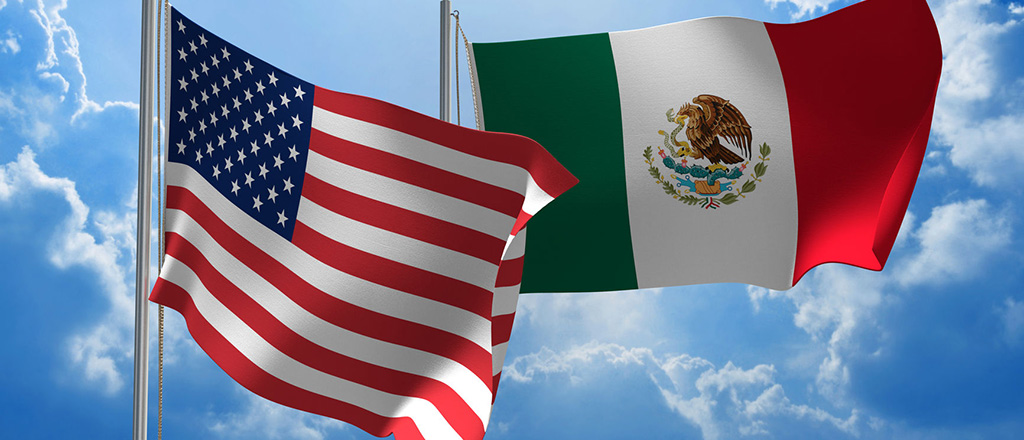Mexico retaliates to US tariffs
June 6, 2018 | Expert Insights

Mexico has retaliated to the metal tariffs imposed by President Trump earlier this month, placing import duties on a number of American products including cheese, bourbon, steel products, and pork.
The World Bank has warned that a trade war could lead to a decline of global trade by 9%.
Background
The relationship between Mexico and the United States has been under review for several years. The two countries share a maritime and land border in North America. Many agreements have been signed between the two countries bilaterally, such as the Gadsden Purchase, and multilaterally, such as the North American Free Trade Agreement. Both countries are members of various international organizations, including the Organization of American States and the United Nations. The two nations do approximately $600 billion in annual trade.
However, ties between Mexico and the US have soured significantly since US President Donald Trump took office. He has promised to build a wall between the US and Mexico to curtail illegal immigration and noted that Mexico would pay for this wall. The Mexican government has denied that it will any such thing.
Trump has been critical of a number of multilateral trade platforms including the Trans-Pacific Partnership. He was also a vocal critic of NAFTA while campaigning. He said, “NAFTA is the worst trade deal maybe ever signed anywhere, but certainly ever signed in this country.” Ties have deteriorated further since President Trump raised the possibility of ending NAFTA. NAFTA, which came into force in 1994, is an agreement signed by Canada, Mexico, and the US. This trilateral trade bloc eliminated nearly all tariffs on Mexico’s exports to the US and vice versa. Most of US-Canada trade was already duty-free before the agreement was signed.
In March, when US President Donald Trump announced global import tariffs of 25% on steel, experts began to raise alarms of an impending trade war. Trade tensions between US and China have escalated rapidly in recent months. Read more on US-China trade tensions here. President Trump’s criticism of “unfair trade practices” has extended to US allies. The US recently announced that it would be enforcing metal tariffs against Canada, Mexico, and the EU. Six of the seven nations part of the G7 have issued a statement expressing their “unanimous concern and disappointment” regarding the tariffs imposed by US President Donald Trump.
Analysis
Mexico has announced tariffs of 20-25% on some American cheeses and bourbon, 25% on American steel products, and 20% on pork leg and shoulder. There will also be a 20% duty on apples and potatoes. Observers have noted that the tariffs target Republican states ahead of the US mid-term elections that will take place in November. Some of these states include Indiana and Kentucky and Iowa, Minnesota, and Virginia.
Mexico is the largest export market for American pork and a net importer of US steel. Approximately 16% of all US exports go to Mexico. However, approximately 80% of Mexican exports are sold to America. Furthermore, approximately 90% of Mexico’s $1.07 billion pork imports come from the US. Mexico has said that it will import more pork from Europe and has opened up a 350,000-tonne quota for imports of the meat from other countries.
“We need trade and one of the things we’re concerned about is long-term implications that these trade issues will have on our partnerships with Mexico and Canada and other markets,” said Iowa Secretary of Agriculture Mike Naig. “If our customers around the world start going to other parts of the world for their supplies, that is a serious problem,” the Republican lawmaker added.
According to media reports, farmers’ organisations have expressed concern that the tariffs will damage their business. Angela Hofmann, deputy director of Farmers for Free Trade said that the tariffs would “exact immediate and painful consequences on many American farmers.” Hofmann added, “Farmers need certainty and open markets to make ends meet. Right now, they are getting chaos and protectionism.”
Chief economic adviser Larry Kudlow recently said that Trump was open to unilateral talks with both Mexico and Canada. However, Mexico and Canada have said that they do not want unilateral negotiations.
World Bank Warning
In their most recent Global Economic Prospects report, the World Bank has warned that "A broad-based increase in tariffs worldwide would have major adverse consequences for global trade and activity."
"An escalation of tariffs up to legally-allowed bound rates could translate into a decline in global trade flows amounting to 9 percent, similar to the drop seen during the global financial crisis in 2008-09," the report noted. It added that any disruption for US or China, the world’s largest economies "would result in significant negative spill overs for the rest of the world through trade, confidence, financial, and commodity-market channels."
Counterpoint
The World Bank report maintained its 3.1% growth forecast for the global economy. Additionally, “trade liberalization trends had already been slowing for some time, with the number of new trade agreements hitting an 18-year low in 2017,” CNBC analyst Natasha Turak noted. Other experts have expressed their belief that the current tensions are negotiating tactics and may not lead to a full-blown trade war.
Assessment
Our assessment is that Trump’s “America First” trade policy may be alienating key allies. Mexico’s response to the tariffs raises further concerns about escalating trade tensions and the future of NAFTA. If other nations such as Canada, China, and EU respond similarly, it could result in a full-blown trade war. As stated previously, we believe that a trade war would be devastating to the global economy.








Comments